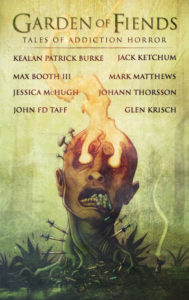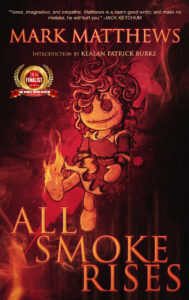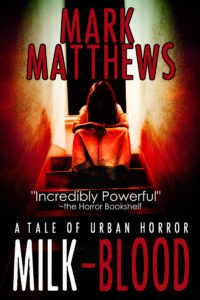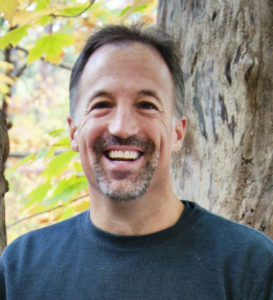This Is All of Us by Mark Matthews
“Humans, as a rule, don’t like mad people unless they are good at painting, and only then once they are dead.” ~Matt Haig, the Humans.
 If it’s true that some of the greatest horror fiction comes from the deepest personal pain, that the torment of the writer weaves itself into fiction, then Horror, the way it shines a light on the darkest parts of humanity, is in a unique position to look at mental health.
If it’s true that some of the greatest horror fiction comes from the deepest personal pain, that the torment of the writer weaves itself into fiction, then Horror, the way it shines a light on the darkest parts of humanity, is in a unique position to look at mental health.
Throughout the month of May, the Horror Writers Association will be honoring Mental Health Awareness Month. The HWA is providing a downloadable list of resources for mental health screening, counseling, and information: https://horror.org/wp-content/uploads/2019/04/HWA_MentalHealthResources_List.pdf. It is also offering a web banner and Facebook profile images for members who wish to show their support throughout the month of May, Mental Health Awareness month: https://horror.org/wp-content/uploads/2019/04/hwa-mental-health-logo-960×960.png. Download these and use them to help spread awareness. In a series of weekly blog posts, Writers will be speaking on the subject of mental health; how it is presented in works of dark fiction, how it uniquely effects the horror community, as well as ways to support anyone grappling with mental health issues to increase self-care.
And this is all of us.
Nobody exists outside the realm of mental health, same as our physical health, it is always in flux, and will deteriorate if not tended to. At times we do things for preventative care, at times we drag ourselves into urgent care in crisis, but mental health effects every human. Nobody is in perfect mental or physical health; it exists in scales that continually shift.
Yet we so often see mental health as existing separate from physical health. We publicly share pictures of ourselves recovering in a hospital bed, or openly ask our boss for time off to see a doctor, but talking with a mental health professional is treated as a weakness, something done only in private, for if others know, that seed of shame will sprout inside us and grow. We offer simplified, insulting solutions, telling those with anxiety or depression, “try taking a walk,” or shame them with, “other people have it worse, be grateful you don’t live in that devastated city of WhatAboutIstan.”
These kind of statements, perhaps spoken with kind intent, are not only unhelpful, but misunderstand the complexity and depth. It’s akin to telling someone with cancer to try getting some sleep, or eating less carbs. Perhaps something healthy, but it’s throwing stones at giants, and something deeper is most likely needed.
Talking to a therapist needs to be received the same as going to the dentist. It’s an act we do to take care of ourselves, a sign of self-care and courage that should be emulated. You are no less of a magnificent human being for having depression, anxiety, or any mental health condition, than you’d be for having a broken leg from a biking accident, having a cancerous mole, or getting that colonoscopy.
 Therapy, in all its facets and components, saved my life. That is not hyperbole. By age 23, I woke up each morning with a drink (god forbid there was no alcohol in the house) and I’d done every drug I could get my hands on. I had been hospitalized multiple times, was bleeding internally, had alcoholic hepatitis of the liver and a swollen pancreas. I was spiritually despondent, wishing for death, but couldn’t seem to die. Finally, when it seemed my only option, I dragged myself bruised and bloody into a treatment center. I followed that up with years of therapy, major lifestyle changes, and have maintained sobriety ever since.
Therapy, in all its facets and components, saved my life. That is not hyperbole. By age 23, I woke up each morning with a drink (god forbid there was no alcohol in the house) and I’d done every drug I could get my hands on. I had been hospitalized multiple times, was bleeding internally, had alcoholic hepatitis of the liver and a swollen pancreas. I was spiritually despondent, wishing for death, but couldn’t seem to die. Finally, when it seemed my only option, I dragged myself bruised and bloody into a treatment center. I followed that up with years of therapy, major lifestyle changes, and have maintained sobriety ever since.
Upon relying on the help of others, I went back to get my Bachelors in English and continued on to get a Masters in Counseling. I’ve worked for years with other addicts and alcoholics trying to give back what I had received, and branched out to work in behavioral health.
If only addicts could grant some understanding on what it is like to live with such a diagnosis, I believe the compassion for addiction would grow. Despite years of sobriety and having shed my skin, the snake still persists. I still have it inside me. I can taste it. Hear it. Point to the part in my body where it exists.
I am quite positive that those suffering from any disorder would wish the same, to give others a taste of understanding of what it is like to live with the disorder so we could stop minimizing and distorting it. Depression isn’t cured by a walk. Anxiety isn’t just a mild discomfort. Post-traumatic stress disorder is a perpetual internal beast that isn’t slayed by exercise alone.
I still seek therapy, and seek it eagerly. I have had therapeutic relationships that have lasted years and still go back in times of need.
Fiction has a powerful therapeutic component, for if we want the truth, what better way to find it than through a story? My work is full of addiction horror, with compassion for the plight of the addict but a look at it substance abuse in all its hideous forms. Nothing new to say that the greatest fiction comes from the writer speaking from the wound, those personal places when we stick the proverbial knife in our heart and bleed it all over the page (Que Mick Jagger). Show me someone’s most powerful work, and you’ll see what’s inside.
Horror writers will always write about mental anguish, with settings such as mental health hospitals and cemeteries, anything that portrays our darker sides and is charged with trauma and the vulnerable parts of our fragile psyche. While I think a certain level of creative license should be granted, there is a duty, I believe, to write about mental health topics with accuracy. We need to do our research. Ask a colleague. Get a beta reader who knows the subject. This will avoid clichés, simplifying, stigmatizing, stereotyping. People are not their condition.
Have you seen a piece of fiction where a character who takes medications is a sign of their strength rather than some dark foreshadowing? Nope, that tab of Risperdal is a version of Chekhov’s Gun, bound to have some negative effect in the next chapter. Works which show a degree of empathy for those suffering, even in the midst of villainous intent, can be the most powerful.
So much horror fiction is a battle for mental health, navigating the minefield of the external darkness that matches our internal landscape. Heroes, anti-heroes, or whole communities, face down the monsters, and the reader understands they are taking an inward journey, tackling their internal demons personified.
The question then becomes, are we able to do in our personal life what we will have our characters do in our fiction? Look inside ourselves and navigate whatever darkness we find, shining a light through the cracks the way we want our protagonists to do?
While we are all the heroes of our own story, we are also minor characters in the journey of others. Do we see it just as noble to help others on their quest? Do we support each other tackling and addressing mental health symptoms, same way we might herald someone in horror fiction?
 By doing so, we can become the empathic catalyst to help each other.
By doing so, we can become the empathic catalyst to help each other.
I think Horror Writers have some of the finest hearts around because they are in touch with the fragile nature of humans. In body, mind, and spirit. Among writers of dark fiction are those who are “not afraid to go there” both in fiction and internal introspection, and also, I suspect, that among us are some of the most hurting, tormented people, who have overcome adversity enough to spin fantastic art. There can certainly be redemptive value in suffering. I’ve latched onto this quote from the Virginia University basketball coach: “If you learn to use it right, adversity will buy you a ticket to a place you couldn’t have gone any other way.”
I write horror not so much to scare others, but because I am the one who is scared; scared of what’s inside me, what’s inside you, but writing about it makes me feel less alone, more okay with bleeding on the page. It that takes courage to show yourself through your words, so we connect when we write and read in a way we never could had we not faced the fear.
Disclosing our own battles with maintaining mental health, while it’s nobody’s damn business and shouldn’t matter, can free others to drop the false shame and share openly.
If she’s talking about how Zoloft helped her but Prozac didn’t, maybe I can do the same.
If he’s sharing his social anxiety and how it feels so disabling, maybe I’m not so strange.
If he’s offering a sober safe place at StokerCon, maybe I’ll say hello if I’m struggling with the same. (Raises hand – I’ll be in Grand Rapids)
Horror writers can be an example of those who openly support each other with compassion and understanding, while writing characters who display humans in all their frightening darkness and magnificent brilliance. Mental Health Awareness month reminds us that we are on the same journey as each of our characters and can decide how to respond when facing our monsters, and to be the supportive agent of change in the journey of others.
 Stay tuned the month of May for much more in-depth discussion.
Stay tuned the month of May for much more in-depth discussion.
MARK MATTHEWS is a graduate of the University of Michigan and a licensed professional counselor who has worked in behavioral health for over 20 years. He is the author of On the Lips of Children, Body of Christ, All Smoke Rises, and Milk-Blood and also the editor of Garden of Fiends: Tales of Addiction Horror, and its upcoming follow-up: Lullabies for Suffering. He lives near Detroit with his wife and two daughters. Reach him at WickedRunPress@Gmail.com



